How to Study Abroad in New Zealand on a Budget
Studying abroad in New Zealand is an incredible opportunity, but with the remote location and relatively high cost of living, it can come with a steep price tag. Learn how to lower the financial burden of studying in Aotearoa with these easy-to-follow tips from New Zealand study abroad alum!
Key Takeaways 🔑
- Learn from the experiences of previous alum and get the inside scoop on affordable transportation options and ways to save money while eating out.
- Find free alternatives to the exhilarating (yet pricey) activities such as free hikes, or find discounts on excursions such as bungee jumping and skydiving.
- Know where to access WiFi instead of using mobile data, and save money on groceries by choosing the correct stores.

With world-class universities, stunning landscapes, a friendly and welcoming culture, and nearly unlimited opportunities for adventure, it's easy to see why New Zealand is one of the top destinations to study abroad.
The main challenge most students face when deciding where to study abroad is their budgetary limitations, and since New Zealand is a relatively expensive option, many may not consider this exceptional country. It's not just the cost of living, either, as flights are long and expensive for those coming from the northern hemisphere, and especially from the United States.
To ensure you experience all you can while studying abroad in New Zealand without breaking the bank, here are nine tips to help you keep costs down and make studying abroad in New Zealand much more affordable.
Note: Budgeting and cost-saving techniques can only go so far. Fortunately, there are external funding options, including various scholarships and grants you can start applying for today!
How much does it cost to study in New Zealand?
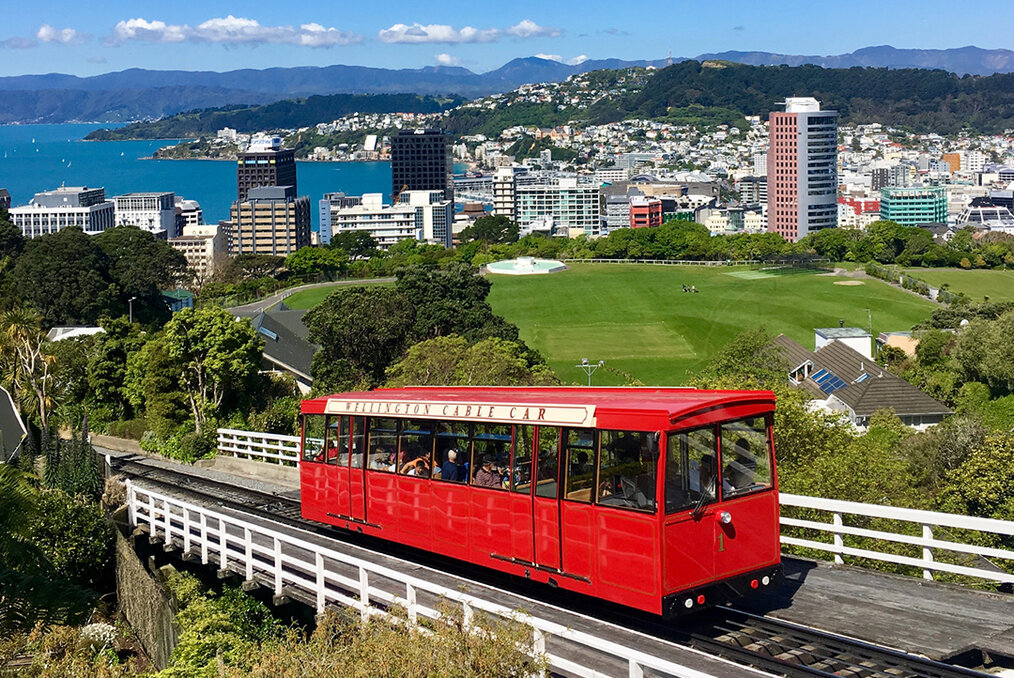
While the cost of studying abroad will vary based on if you directly enroll with a university or travel through a program provider, the city you decide to study in, and your ability to find funding, knowing how much you should expect to spend can help you build a budget and set your expectations. The main costs you will incur will be tuition (or program fees), living expenses such as rent and food, and transportation, including flights.
New Zealand's universities are spread between the North and South Islands, with the University of Auckland and Victoria University of Wellington on the North Island, and the Univeristy of Otago in Dunedin and the University of Canterbury in Christchurch on the South Island. If you are on a tight budget, consider the North Island options first, as the (even more) remote nature of the South Island increases travel expenses, which offsets the lower cost of living there.
For example, suppose you're studying at the University of Dunedin on the South Island. In that case, you will need to fly into Auckland airport and then fly down to the South Island before finding ground transportation to your place of residence. All of these expenses add up, making the University of Auckland an excellent choice and, by far, the most convenient.
Compare the cost of studying abroad in each city, including tuition fees and average living expenses, by reading our New Zealand study abroad cost breakdown article. Additionally, you can reference the following chart to compare the cost of living in each city.
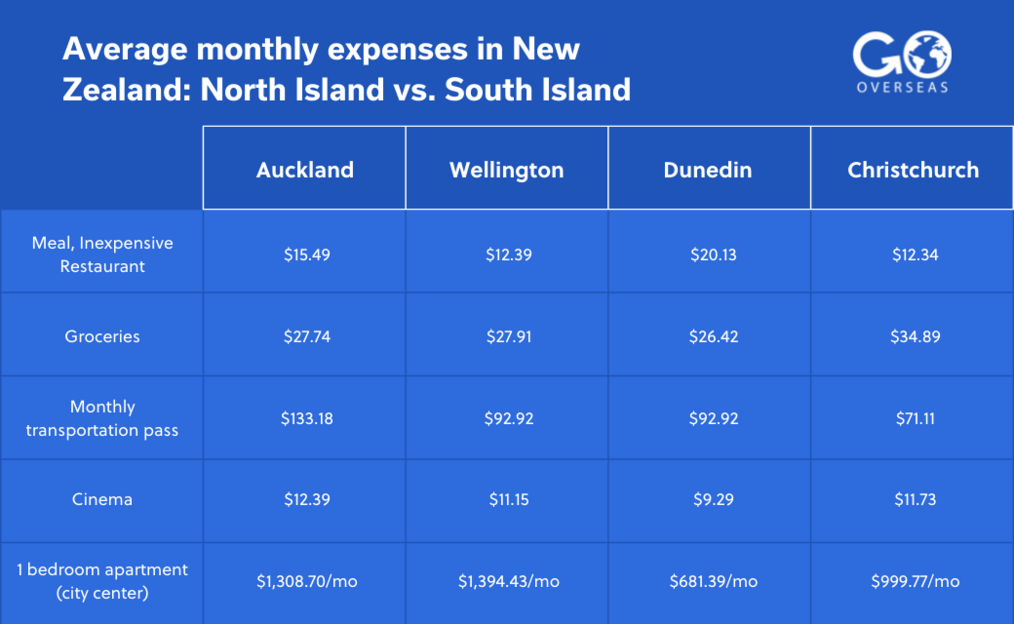
Use InterCity for transportation
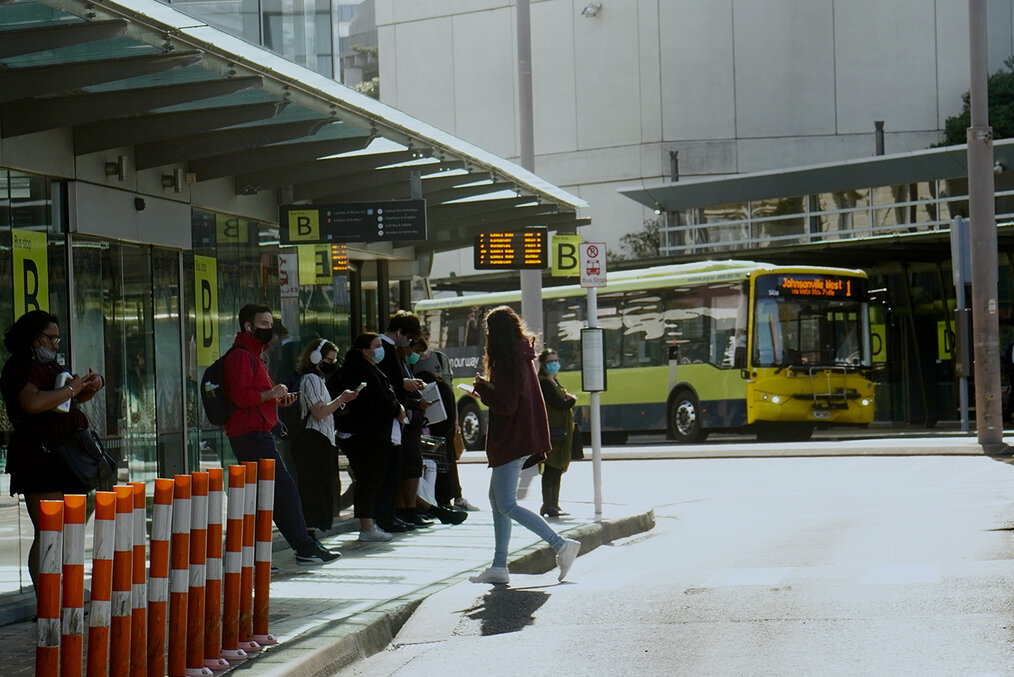
InterCity is a massive bus service that services around 600 locations across New Zealand, and it is often the country's cheapest transportation option. They have an extensive network of routes and the buses are clean, safe, and comfortable. In fact, they even have an overnight option with lie-flat beds between Auckland and Wellington. If you book far enough in advance, you could even score a $1 fare for some routes. InterCity also offers hours-based bus passes, known as the Flexipass, where you pay in advance by the hour and receive a discounted rate.
Take advantage of BYOW restaurants

After a week of hitting the books, you may find yourself craving a glass of New Zealand’s world-famous white wine while getting a nice meal out at a restaurant.
Rather than buying wine by the glass, how about bringing your own bottle of wine instead? There are actually a ton of "BYOW" restaurants in NZ, many of which are in Auckland. Of course, cooking at home is the surest way to keep costs down, but experiencing a country's culinary scene is a valuable component of a culturally immersive experience, so give yourself some balance without compromising on your budget.
Indulge in the free hiking trails

New Zealand is considered the adventure capital of the world, and sure, bungee jumping, parasailing, and skydiving are all intriguing experiences. If you've come all the way to New Zealand, you'll probably want to try some adrenaline-rush experiences between classes or on weekends.
Rather than spending hundreds of dollars partaking in any of the activities above, consider exploring New Zealand’s captivating hiking trails like Tauranga Stream Suspension Bridge Loop Walk and Long Bay Walk. The hikes not only offer optimal views of the appealing scenery but are alternatives to the expensive extreme thrill activities. Not to mention, they are all completely free, which is perfect for your student budget!
Utilize price-tracking tools to snag lower-cost flights
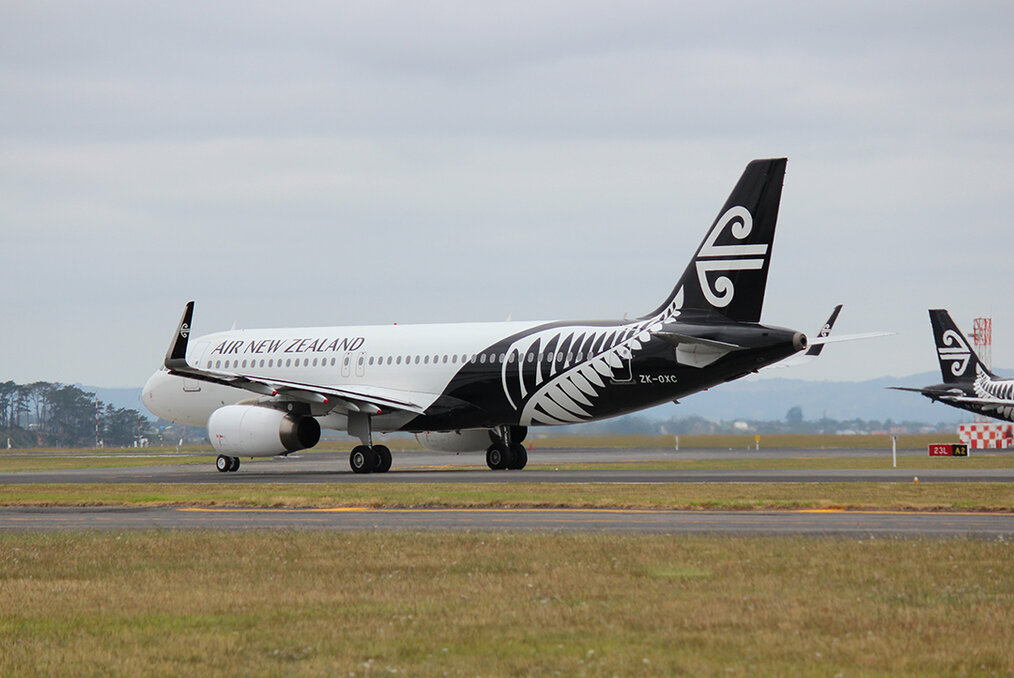
Since airfare is a considerable expense when traveling to New Zealand, with round trip prices ranging from $2,000 - $3,000, its best to book well in advance. Tools such as Skyscanner or the Hopper app can help compare prices and find the most affordable options.
Whenever purchasing international airfare, there are strategies you can employ to keep the costs down as much as possible. Flying during the weekday will likely be cheaper than weekend itineraries, and if you can make your journey during the offseason, that's even better! Remember, since New Zealand is in the southern hemisphere, its seasons are reversed compared to northern hemisphere countries like the US. This means peak summer (and the busiest time to visit) is between December and February.
You can often save money by flying with multiple airlines if you aren't taking a direct flight; however, try to find partner airlines for convenience. Another tip is to pay close attention to the extra fees some airlines charge, such as baggage and seat selection. One airline's airfare may appear to be cheaper, but the price difference quickly vanishes when you add a suitcase or choose to sit by a window.
Finally, try to keep your luggage to a minimum. Not only will you be annoyed at having to haul multiple bags and suitcases around, but an extra suitcase can cost hundreds of dollars more to fly back and forth. Consider leaving certain items behind that you can purchase once you're in New Zealand instead, and remember to leave some room for goodies you acquire along the way.
Additional reading: The Ultimate Study Abroad Packing Guide
Snag yourself a City Pass

As you’ll learn from talking to local classmates, there are two main ‘big’ cities in New Zealand: Wellington and Auckland. Both cities contain many attractions, including observatories, zoos, museums, and much more. You’ll likely want to experience them all to get a better sense of the country’s culture and history, but unfortunately, admission to these city attractions can add up. Fortunately, both Wellington and Auckland offer City Pass, which allows you to see multiple city attractions at an established, discounted rate.
Add Bookme.co.nz to your internet browser’s favorites

If you plan to take a weekend break from your studies and experience any of the mainstream excursions, you should definitely consult BookMe, an online deal site, prior to making a reservation. BookMe offers major deals on popular attractions like jet boating, mountain biking, rock climbing, zip-lining and much more. Plus, BookMe allows you to book your desired activity directly through the website, which delivers an added convenience.
If you're planning any of the tours to top attractions, it's my top tip for helping you save some money and not skip out on the experiences you came to New Zealand to have!
Frequent the free WiFi cafes

Save yourself from the hefty data roaming charges by turning off your cellular data. When you need to use the internet, whether to post on social media about the progress of your semester overseas or whatever the case may be, grab a seat in one of the many coffee shops offering free WiFi.
If you’re not a big coffee drinker, there are also internet cafés in the big cities, such as Wellington and Auckland, that deliver internet accessibility at an affordable rate. Additionally, all McDonalds throughout New Zealand have reliable WiFi (and they arent hard to find).
Do your grocery shopping at Pak’nSave
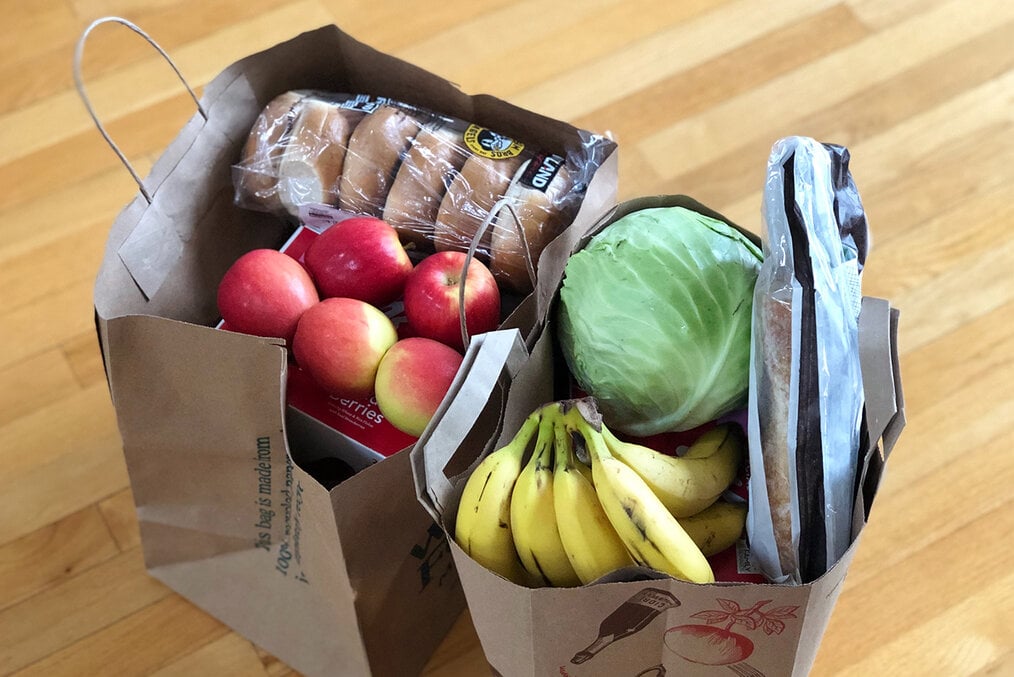
Similar to Costco, Pak’nSave is a food warehouse chain that typically sells the cheapest groceries around. In fact, their slogan is simply stated, “Our Policy: NZ’s Lowest Food Prices.” With 57 convenient locations across NZ that are easily spotted by yellow building exteriors, there’s no reason to shop elsewhere for groceries.
Pakn’Save is especially budget-friendly when you buy large quantities of groceries. So, if you’re planning on hosting a dinner party for your classmates, be sure Pak’nSave is where you purchase all your ingredients!
Skip the souvenirs -- send photos to your loved ones instead

Almost every New Zealand gift store sells ever-soft merino sheep wool and jars of the world-famous Manuka honey. Initially, these items may seem like appealing gifts to bring to family and friends back home, but they come at a price -- a hefty price tag.
Rather than breaking the bank (and space in your suitcase) on presents such as these, how about sending your loved ones a photo of the gorgeous landscapes instead? You don’t have to be a professional photographer to snap a shot of the magnificent mountain ranges or coastlines. Plus, your loved ones will appreciate being able to grasp a firsthand view of your study abroad sights!
Make your dream of studying in New Zealand a reality!

Studying abroad in New Zealand is an experience that will help expand your perspective, give you insights into another culture, and inspire your future travels. As I can attest from my experience, you need to be budget-conscious to fully take advantage of New Zealand's many attributes. For most of us, these tips still won't be enough to make studying abroad in New Zealand affordable, but they will help! The best thing you can do to make your dreams a reality is to apply for scholarships and grants from organizations and program providers.
Ready to take the next steps in your planning process? Check out our other articles to help you achieve the study abroad experience of a lifetime!
